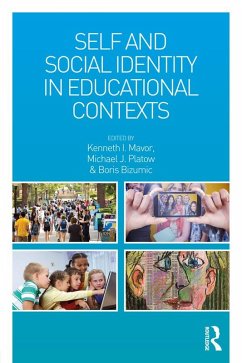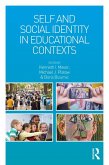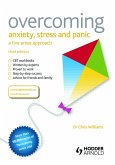Self and Social Identity in Educational Contexts (eBook, ePUB)
Redaktion: Mavor, Kenneth I.; Bizumic, Boris; Platow, Michael J.
52,95 €
52,95 €
inkl. MwSt.
Sofort per Download lieferbar

26 °P sammeln
52,95 €
Als Download kaufen

52,95 €
inkl. MwSt.
Sofort per Download lieferbar

26 °P sammeln
Jetzt verschenken
Alle Infos zum eBook verschenken
52,95 €
inkl. MwSt.
Sofort per Download lieferbar
Alle Infos zum eBook verschenken

26 °P sammeln
Self and Social Identity in Educational Contexts (eBook, ePUB)
Redaktion: Mavor, Kenneth I.; Bizumic, Boris; Platow, Michael J.
- Format: ePub
- Merkliste
- Auf die Merkliste
- Bewerten Bewerten
- Teilen
- Produkt teilen
- Produkterinnerung
- Produkterinnerung

Bitte loggen Sie sich zunächst in Ihr Kundenkonto ein oder registrieren Sie sich bei
bücher.de, um das eBook-Abo tolino select nutzen zu können.
Hier können Sie sich einloggen
Hier können Sie sich einloggen
Sie sind bereits eingeloggt. Klicken Sie auf 2. tolino select Abo, um fortzufahren.

Bitte loggen Sie sich zunächst in Ihr Kundenkonto ein oder registrieren Sie sich bei bücher.de, um das eBook-Abo tolino select nutzen zu können.
This innovative volume is the first to apply a social identity theory perspective to the field of teaching and education and thereby sheds new and stimulating light on a variety of different of pedagogical concerns and practices.
- Geräte: eReader
- mit Kopierschutz
- eBook Hilfe
- Größe: 2.33MB
Andere Kunden interessierten sich auch für
![Self and Social Identity in Educational Contexts (eBook, PDF) Self and Social Identity in Educational Contexts (eBook, PDF)]() Self and Social Identity in Educational Contexts (eBook, PDF)52,95 €
Self and Social Identity in Educational Contexts (eBook, PDF)52,95 €![Defending Standardized Testing (eBook, ePUB) Defending Standardized Testing (eBook, ePUB)]() Defending Standardized Testing (eBook, ePUB)57,95 €
Defending Standardized Testing (eBook, ePUB)57,95 €![Patient Treatment Adherence (eBook, ePUB) Patient Treatment Adherence (eBook, ePUB)]() Patient Treatment Adherence (eBook, ePUB)56,95 €
Patient Treatment Adherence (eBook, ePUB)56,95 €![Overcoming Anxiety, Stress and Panic: A Five Areas Approach (eBook, ePUB) Overcoming Anxiety, Stress and Panic: A Five Areas Approach (eBook, ePUB)]() Chris WilliamsOvercoming Anxiety, Stress and Panic: A Five Areas Approach (eBook, ePUB)31,95 €
Chris WilliamsOvercoming Anxiety, Stress and Panic: A Five Areas Approach (eBook, ePUB)31,95 €![Sleep Science (eBook, ePUB) Sleep Science (eBook, ePUB)]() Sleep Science (eBook, ePUB)37,95 €
Sleep Science (eBook, ePUB)37,95 €![Encyclopedia of Stress (eBook, ePUB) Encyclopedia of Stress (eBook, ePUB)]() Encyclopedia of Stress (eBook, ePUB)1.299,95 €
Encyclopedia of Stress (eBook, ePUB)1.299,95 €![Educational Psychology (eBook, ePUB) Educational Psychology (eBook, ePUB)]() Educational Psychology (eBook, ePUB)46,95 €
Educational Psychology (eBook, ePUB)46,95 €-
-
-
This innovative volume is the first to apply a social identity theory perspective to the field of teaching and education and thereby sheds new and stimulating light on a variety of different of pedagogical concerns and practices.
Dieser Download kann aus rechtlichen Gründen nur mit Rechnungsadresse in A, B, BG, CY, CZ, D, DK, EW, E, FIN, F, GR, HR, H, IRL, I, LT, L, LR, M, NL, PL, P, R, S, SLO, SK ausgeliefert werden.
Produktdetails
- Produktdetails
- Verlag: Taylor & Francis eBooks
- Seitenzahl: 378
- Erscheinungstermin: 24. Februar 2017
- Englisch
- ISBN-13: 9781317599753
- Artikelnr.: 47953003
- Verlag: Taylor & Francis eBooks
- Seitenzahl: 378
- Erscheinungstermin: 24. Februar 2017
- Englisch
- ISBN-13: 9781317599753
- Artikelnr.: 47953003
- Herstellerkennzeichnung Die Herstellerinformationen sind derzeit nicht verfügbar.
Kenneth I. Mavor is Lecturer in Psychology in the School of Psychology and Neuroscience at the University of St Andrews, UK. His research focuses on the cognitive underpinnings of self and identity and the implications of social identity in a variety of contexts including education, religiosity, collective action and health. Michael J. Platow is Professor of Psychology at the Australian National University and a Fellow of the Academy of Social Sciences in Australia. His research examines leadership and social influence, fairness and trust, prejudice and intergroup relations, and group identities and learning. His teaching has been recognised by a Commonwealth Office of Learning and Teaching Carrick Citation. Boris Bizumic is Senior Lecturer in Psychology in the Research School of Psychology at the Australian National University. His research expertise is in social, personal and political psychology. He has published widely in the areas of ethnocentrism, prejudice, group identity, education, personality, attitudes, cross-cultural research and scale construction.
Contributors
PART I: Introducing social identity in educational contexts
1. Introducing self and social identityin educational contexts:
promoting learning, managing conflict, facilitating change (Michael
J. Platow, Kenneth I. Mavor and Boris Bizumic)
2. The social identity approach to education and learning:
Identification, ideation, interaction, influence and ideology (S.
Alexander Haslam)
PART II: Social identity in the classroom and playground
3. School climate, social identity processes and school outcomes: making
the case for a group-level approach to understanding schools (
Katherine J. Reynolds, Emina Subasic, Eunro Lee and Dave Bromhead)
4. Bullying and belonging: social identity on the playground (Siân E.
Jones, Andrew G. Livingstone and Antony S. R. Manstead)
PART III: Social identities between the classroom and beyond
5. Why so few? The role of social identity and situational cues in
understanding the underrepresentation of women in STEM fields (
Kathryn L. Boucher and Mary C. Murphy)
6. The educational experience of students from low socio-economic status
background (Jolanda Jetten, Aarti Iyer and Airong Zhang)
7. Indigenous education in Australia: a battle of identities (Diana M.
Grace and Michael J. Platow)
8. Education and social participation: civic identity and civic action
in formal and informal education contexts (Emma F. Thomas, Craig
McGarty, Avelie Stuart, Girish Lala and Anne Pedersen)
PART IV: Becoming and influencing: the role of social identity in
student life
9. University students' social identity and health behaviours (Joanne R.
Smith, Winnifred R. Louis and Mark Tarrant)
10. The role of psychological need satisfaction in promoting student
identification (Katharine Greenaway, Catherine E. Amiot, Winnifred R.
Louis and Sarah V. Bentley)
11. Uncertainty in transition: the influence of group cohesion on
learning (Tegan Cruwys, Amber M. Gaffney and Yvonne Skipper)
PART V: Approaches to learning and academic performance
12. The role of students' social identities in fostering high-quality
learning in higher education (Ana-Maria Bliuc, Peter Goodyear and
Robert A. Ellis)
13. Understanding social identity in education: the modifying role for
perceived norms (Lillian Smyth, Kenneth I. Mavor, Michael J. Platow
and Diana M. Grace)
14. Performance in small student groups: group personality, identity and
norms (Conal Monaghan and Boris Bizumic)
15. Student identity and the marketization of higher education (Stefanie
J. Sonnenberg)
PART VI: Insights and applications from medical education
16. Stereotyping and the development of clinicians' professional
identities (Bryan Burford and Harriet E. S. Rosenthal-Stott)
17. Hero, voyeur, judge: understanding medical students' moral identities
through professionalism dilemma narratives (Lynn V. Monrouxe and
Charlotte E. Rees)
18. The complexity of medical education: social identity and normative
influence in well-being and approaches to learning (Kathleen G.
McNeill, Lillian Smyth and Kenneth I. Mavor)
PART VII: Making connections
19. The social construction of teachers' identities: finding connections
in social identity and post-structuralist perspectives (Emma Rich,
Kenneth I. Mavor and Louisa Webb)
Index
PART I: Introducing social identity in educational contexts
1. Introducing self and social identityin educational contexts:
promoting learning, managing conflict, facilitating change (Michael
J. Platow, Kenneth I. Mavor and Boris Bizumic)
2. The social identity approach to education and learning:
Identification, ideation, interaction, influence and ideology (S.
Alexander Haslam)
PART II: Social identity in the classroom and playground
3. School climate, social identity processes and school outcomes: making
the case for a group-level approach to understanding schools (
Katherine J. Reynolds, Emina Subasic, Eunro Lee and Dave Bromhead)
4. Bullying and belonging: social identity on the playground (Siân E.
Jones, Andrew G. Livingstone and Antony S. R. Manstead)
PART III: Social identities between the classroom and beyond
5. Why so few? The role of social identity and situational cues in
understanding the underrepresentation of women in STEM fields (
Kathryn L. Boucher and Mary C. Murphy)
6. The educational experience of students from low socio-economic status
background (Jolanda Jetten, Aarti Iyer and Airong Zhang)
7. Indigenous education in Australia: a battle of identities (Diana M.
Grace and Michael J. Platow)
8. Education and social participation: civic identity and civic action
in formal and informal education contexts (Emma F. Thomas, Craig
McGarty, Avelie Stuart, Girish Lala and Anne Pedersen)
PART IV: Becoming and influencing: the role of social identity in
student life
9. University students' social identity and health behaviours (Joanne R.
Smith, Winnifred R. Louis and Mark Tarrant)
10. The role of psychological need satisfaction in promoting student
identification (Katharine Greenaway, Catherine E. Amiot, Winnifred R.
Louis and Sarah V. Bentley)
11. Uncertainty in transition: the influence of group cohesion on
learning (Tegan Cruwys, Amber M. Gaffney and Yvonne Skipper)
PART V: Approaches to learning and academic performance
12. The role of students' social identities in fostering high-quality
learning in higher education (Ana-Maria Bliuc, Peter Goodyear and
Robert A. Ellis)
13. Understanding social identity in education: the modifying role for
perceived norms (Lillian Smyth, Kenneth I. Mavor, Michael J. Platow
and Diana M. Grace)
14. Performance in small student groups: group personality, identity and
norms (Conal Monaghan and Boris Bizumic)
15. Student identity and the marketization of higher education (Stefanie
J. Sonnenberg)
PART VI: Insights and applications from medical education
16. Stereotyping and the development of clinicians' professional
identities (Bryan Burford and Harriet E. S. Rosenthal-Stott)
17. Hero, voyeur, judge: understanding medical students' moral identities
through professionalism dilemma narratives (Lynn V. Monrouxe and
Charlotte E. Rees)
18. The complexity of medical education: social identity and normative
influence in well-being and approaches to learning (Kathleen G.
McNeill, Lillian Smyth and Kenneth I. Mavor)
PART VII: Making connections
19. The social construction of teachers' identities: finding connections
in social identity and post-structuralist perspectives (Emma Rich,
Kenneth I. Mavor and Louisa Webb)
Index
Contributors
PART I: Introducing social identity in educational contexts
1. Introducing self and social identityin educational contexts:
promoting learning, managing conflict, facilitating change (Michael
J. Platow, Kenneth I. Mavor and Boris Bizumic)
2. The social identity approach to education and learning:
Identification, ideation, interaction, influence and ideology (S.
Alexander Haslam)
PART II: Social identity in the classroom and playground
3. School climate, social identity processes and school outcomes: making
the case for a group-level approach to understanding schools (
Katherine J. Reynolds, Emina Subasic, Eunro Lee and Dave Bromhead)
4. Bullying and belonging: social identity on the playground (Siân E.
Jones, Andrew G. Livingstone and Antony S. R. Manstead)
PART III: Social identities between the classroom and beyond
5. Why so few? The role of social identity and situational cues in
understanding the underrepresentation of women in STEM fields (
Kathryn L. Boucher and Mary C. Murphy)
6. The educational experience of students from low socio-economic status
background (Jolanda Jetten, Aarti Iyer and Airong Zhang)
7. Indigenous education in Australia: a battle of identities (Diana M.
Grace and Michael J. Platow)
8. Education and social participation: civic identity and civic action
in formal and informal education contexts (Emma F. Thomas, Craig
McGarty, Avelie Stuart, Girish Lala and Anne Pedersen)
PART IV: Becoming and influencing: the role of social identity in
student life
9. University students' social identity and health behaviours (Joanne R.
Smith, Winnifred R. Louis and Mark Tarrant)
10. The role of psychological need satisfaction in promoting student
identification (Katharine Greenaway, Catherine E. Amiot, Winnifred R.
Louis and Sarah V. Bentley)
11. Uncertainty in transition: the influence of group cohesion on
learning (Tegan Cruwys, Amber M. Gaffney and Yvonne Skipper)
PART V: Approaches to learning and academic performance
12. The role of students' social identities in fostering high-quality
learning in higher education (Ana-Maria Bliuc, Peter Goodyear and
Robert A. Ellis)
13. Understanding social identity in education: the modifying role for
perceived norms (Lillian Smyth, Kenneth I. Mavor, Michael J. Platow
and Diana M. Grace)
14. Performance in small student groups: group personality, identity and
norms (Conal Monaghan and Boris Bizumic)
15. Student identity and the marketization of higher education (Stefanie
J. Sonnenberg)
PART VI: Insights and applications from medical education
16. Stereotyping and the development of clinicians' professional
identities (Bryan Burford and Harriet E. S. Rosenthal-Stott)
17. Hero, voyeur, judge: understanding medical students' moral identities
through professionalism dilemma narratives (Lynn V. Monrouxe and
Charlotte E. Rees)
18. The complexity of medical education: social identity and normative
influence in well-being and approaches to learning (Kathleen G.
McNeill, Lillian Smyth and Kenneth I. Mavor)
PART VII: Making connections
19. The social construction of teachers' identities: finding connections
in social identity and post-structuralist perspectives (Emma Rich,
Kenneth I. Mavor and Louisa Webb)
Index
PART I: Introducing social identity in educational contexts
1. Introducing self and social identityin educational contexts:
promoting learning, managing conflict, facilitating change (Michael
J. Platow, Kenneth I. Mavor and Boris Bizumic)
2. The social identity approach to education and learning:
Identification, ideation, interaction, influence and ideology (S.
Alexander Haslam)
PART II: Social identity in the classroom and playground
3. School climate, social identity processes and school outcomes: making
the case for a group-level approach to understanding schools (
Katherine J. Reynolds, Emina Subasic, Eunro Lee and Dave Bromhead)
4. Bullying and belonging: social identity on the playground (Siân E.
Jones, Andrew G. Livingstone and Antony S. R. Manstead)
PART III: Social identities between the classroom and beyond
5. Why so few? The role of social identity and situational cues in
understanding the underrepresentation of women in STEM fields (
Kathryn L. Boucher and Mary C. Murphy)
6. The educational experience of students from low socio-economic status
background (Jolanda Jetten, Aarti Iyer and Airong Zhang)
7. Indigenous education in Australia: a battle of identities (Diana M.
Grace and Michael J. Platow)
8. Education and social participation: civic identity and civic action
in formal and informal education contexts (Emma F. Thomas, Craig
McGarty, Avelie Stuart, Girish Lala and Anne Pedersen)
PART IV: Becoming and influencing: the role of social identity in
student life
9. University students' social identity and health behaviours (Joanne R.
Smith, Winnifred R. Louis and Mark Tarrant)
10. The role of psychological need satisfaction in promoting student
identification (Katharine Greenaway, Catherine E. Amiot, Winnifred R.
Louis and Sarah V. Bentley)
11. Uncertainty in transition: the influence of group cohesion on
learning (Tegan Cruwys, Amber M. Gaffney and Yvonne Skipper)
PART V: Approaches to learning and academic performance
12. The role of students' social identities in fostering high-quality
learning in higher education (Ana-Maria Bliuc, Peter Goodyear and
Robert A. Ellis)
13. Understanding social identity in education: the modifying role for
perceived norms (Lillian Smyth, Kenneth I. Mavor, Michael J. Platow
and Diana M. Grace)
14. Performance in small student groups: group personality, identity and
norms (Conal Monaghan and Boris Bizumic)
15. Student identity and the marketization of higher education (Stefanie
J. Sonnenberg)
PART VI: Insights and applications from medical education
16. Stereotyping and the development of clinicians' professional
identities (Bryan Burford and Harriet E. S. Rosenthal-Stott)
17. Hero, voyeur, judge: understanding medical students' moral identities
through professionalism dilemma narratives (Lynn V. Monrouxe and
Charlotte E. Rees)
18. The complexity of medical education: social identity and normative
influence in well-being and approaches to learning (Kathleen G.
McNeill, Lillian Smyth and Kenneth I. Mavor)
PART VII: Making connections
19. The social construction of teachers' identities: finding connections
in social identity and post-structuralist perspectives (Emma Rich,
Kenneth I. Mavor and Louisa Webb)
Index







